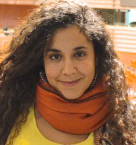Sabrina Chakori is a new economy leader and graduate of the Spring 2016 Caring Economy Advocates Program. She is attending?COP22?this week in Marrakech, Morroco.

By Sabrina Chakori – ? Sydney, Australia August 2016
Building the new economy: activism, enterprise and social change. This was the title of the conference that took place in Sydney on the 16th and 17th of August, 2016.
While many groups and organizations try to fight and fix some aspects of the ecological and social crisis that we are facing, also in Australia, as in the US, other movements are growing with the aim to redefine a new framework for the next economic system.
The different panels and presentations illustrated many aspects of the new economy: some focused on the importance of cooperatives, other showed how community exchange can reduce consumption and other speakers explained the new paths that we could undertake in order to build a more social and ecological inclusive economy. From permaculture projects to community owned renewable energies, every aspect demonstrated the importance of the community engagement in any of the changes that we need to make.
When thinking to a new economy, often happen that the values claimed are not really new. They are part of an ?old? local and sustainable economy, pre-liberalism, that used to care about the (real) well being of people and of the environment. Thanks to the participation of some aboriginal people, such as Dr. Anne Poelina, Managing Director Majala Inc, and Ross Williams, Bindal/Juru people, the debate focused on the importance of caring and respecting the land.
?Redefining people in sustainable economies: the consumer has to go? was the title of the workshop that I organized with Dr. Peter Daniels of the Griffith University. We analysed the central notion of ?consumers? that plays such an important role in directing contemporary, high-income societies. The idea of a ?consumer? as the central actor in the economy comes from an inappropriate mind set or ideology founded on an assumption that wellbeing is mainly derived from transforming ?raw materials? from nature and consuming or using up these resources and their products. Both ?production? and ?consumption? imply destructive actions and losses from natural capital that will easily be replaced, regenerated or technological fixed.
The interactive session aimed to: 1) Identify what motives, goals and desired outcomes actually lie behind people?s collective quest for wellbeing (versus just a desire for ?consumption?); 2) Discuss how to mobilize social movements bringing back awareness on our role in a new economic system with particular attention to the ?consumer?-citizen nexus; 3) Identify dimensions that can help to propose and promote a new term to replace ?consumers? as the central actors in the economy ? with a notion of people that is more compatible with sustainable societies.
?How can we reimagine work, exchange, money, care, law and our relationship with the natural world through the prism of a new economy?? This questions was the centralfocus of this conference and a catalyst for future new economy events in Australia.
Sabrina is?attending COP22 (the?22nd session of the Conference of the Parties, United Nations Framework Convention on Climate Change) this week in Marrakech, Morocco. She is a?part of negotiations representing young European ?greens??and will be writing about the?caring economy approach in the?context of current climate negotiations. Stay tuned?
Read about the?Caring Economy Advocates Program


Leave a Reply